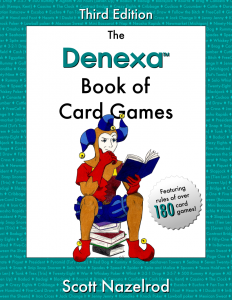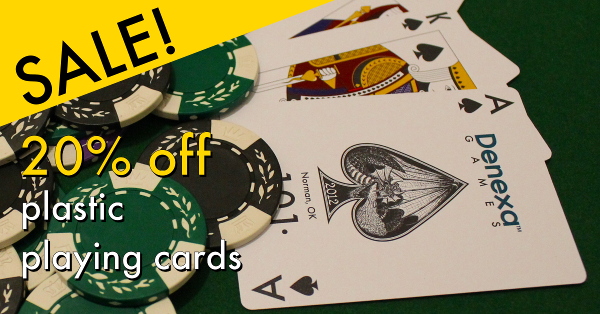Fifty-One
Fifty-One (in Japanese, goju ichi) is a popular Japanese family card game. (It is also played in China under significantly more complicated rules.) It is best for four players, but it can played by as few as two or as many as five.
Object of Fifty-One
The object of Fifty-One is to form a hand with the highest-ranked cards in one suit.
Setup
Fifty-One uses the standard international 52-card pack, like you’ll find in a set of Denexa 100% Plastic Playing Cards. If desired, a joker may be added as a wild card.
Shuffle and deal five cards, face down, to each player. Then, deal five board cards face up to the center of the table. The remainder of the deck forms the stock.
Game play
In Fifty-One, hands are scored by calculating the value of the longest suit, then subtracting the value of the off-suit cards. Aces are worth eleven points, face cards are worth ten, and all other cards their face value. For example, a hand containing J♦-9♦-3♦-8♣-4♥ would have a score of ten (10+9+3=22 for the diamonds minus 8+4=12 for the other two cards). If playing with the joker, it can stand for any card that is not in the player’s hand (in most cases it will be played as either an ace or a ten-value card). It is possible to have a hand that has a negative overall score.
The player to the left of the dealer goes first. On each turn, a player picks up one of the five board cards, then replaces it with a different card from their hand. After the first turn, a player also has the option to clear the board by moving the five board cards to a discard pile and dealing five new board cards from the stock. A player may only clear the board once per turn; after clearing the board, the player must take one of the cards just dealt. If the stock runs out during the process of replenishing the board, then the discard pile is shuffled and turned face down to form a new stock, and the remainder of the board is dealt as usual.
When a player is satisfied with their hand, they may call out “Stop!” Each other player has one more turn to complete their hand. When the turn makes it back to the player who called Stop, the hands are revealed and scored. Whoever holds the highest-scoring hand is the winner. In the event of a tie between the player who called Stop and any other player, the other player wins; all other ties are a shared victory between the players with the high score.


